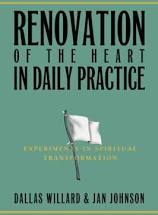DAVE'S SUMMARY: Along the line of family tensions, my lifelong buddy and I,
both followers of Jesus, have talked and fretted over wayward children, now
grown. Now we’ve discovered a book, shedding light on God’s Word and God’s Word
shedding light on this book. The book is called Renovation of the Heart, Putting
On the Character of Christ by Dallas Willard.
The author talks about our messed up hearts or souls that need godly formation
or transformation.
Consider jotting down, if you will, four words. What contributes to messing up our soul or heart or spirit:
WRAP-UP
1. Letting love be
completely real
2. Abhorring what is evil
3. Clinging to what is good
4. Being
devoted to one another in family-like love (philostorgoi)
5. Outdoing one
another in giving honor
6. Serving the Lord with ardent spirit and all
diligence
7. Rejoicing in hope 8. Being patient in troubles
9. Being devoted
constantly to prayer
10. Contributing to the needs of the saints
11. Pursuing
(running after) hospitality
12. Blessing persecutors and not cursing them
13.
Being joyful with those who are rejoicing and being sorrowful with those in
sorrow
14. Living in harmony with each other
15. Not being haughty, but fitting
right in with the “lowly” in human terms
16. Not seeing yourself as wise
17.
Never repaying evil for evil
18. Having due regard for what everyone takes to
be right
19. Being at peace with everyone, so far as it depends on you
20.
Never taking revenge, but leaving that to whatever God may decide
21. Providing
for needy enemies
22. Not being overwhelmed by evil, but overwhelming evil with
good.
This is the most adequate biblical description of what the details of a
spiritually transformed social dimension look like. We should pause to contemplate it. Just think for a
moment what it would be like to be part of a group of disciples in which this
list was the conscious, shared intention, and where it was actually lived out,
even if with some imperfection.
You can see, I think, how it would totally transform the marriage relation and the home and family. Its effect on the community would be incalculable, as it in fact has been wherever realized throughout the history of Christ’s people on earth. The abandonment of all defensiveness and its many strategies would clearly be achieved in such a group. There would no longer be any need for them. In their place would be receptiveness and blessing for all, even enemies.
Certainly, to achieve this in our social dimension we must have heard and accepted the gospel of grace, of Jesus’ defenseless death on the cross on our behalf, and of his acceptance of us into his life beyond death and beyond the worst that could be done to him or to us. We must stand safe and solid in his kingdom.
The social world is set before us as an infinite task, which can only be carried out in the power of God. We accept that. Just as we cannot be the husband or wife or parent God intends except in the power of God, so for our life as a whole. We do not even know how to pray as we ought, Paul tells us (Romans 8:26). What then, shall we not pray? By no means, for “the Spirit Himself intercedes for us with groanings too deep for words” (verse 26). And the Spirit of God will enter into all of our social connections if we invite him, wait on him, and proceed as best we can.
We have the promise of Jesus to those who live by his “living water.” That water “shall become in him a well of water springing up to eternal life” (John 4:14), and “‘from his innermost being shall flow rivers of living water’” (John 7:38; compare Isaiah 58:11). Spiritual formation in Christ obviously requires that we increasingly be happily reconciled to living in and by the direct upholding of the hand of God.
This is clearly what the entire biblical view of life calls for, and especially what Jesus himself lived and presented as the truth. Only from within this gospel outlook on life can we begin to approach the godly reformation of the self in its social world. But from within that outlook we can cease from assault and withdrawal and can extend ourselves in blessing to all whose lives we touch.
Willard, Dallas. Renovation of the Heart: Putting On the
Character of Christ (pp. 195-197). The Navigators. Kindle Edition.
To review the life-transforming action steps, click on the white links above the pictured book recommendations here:
roundtableministries.com

















































